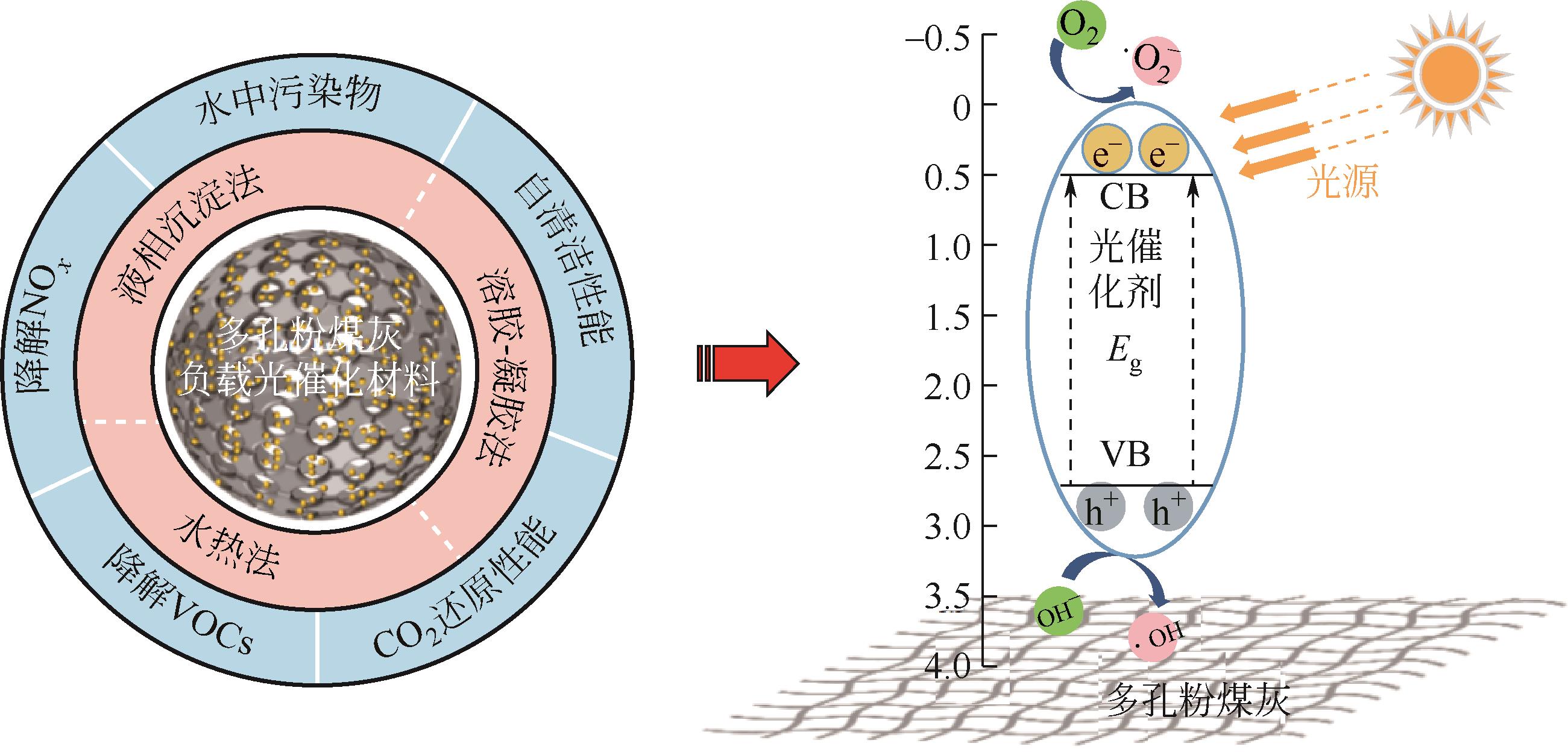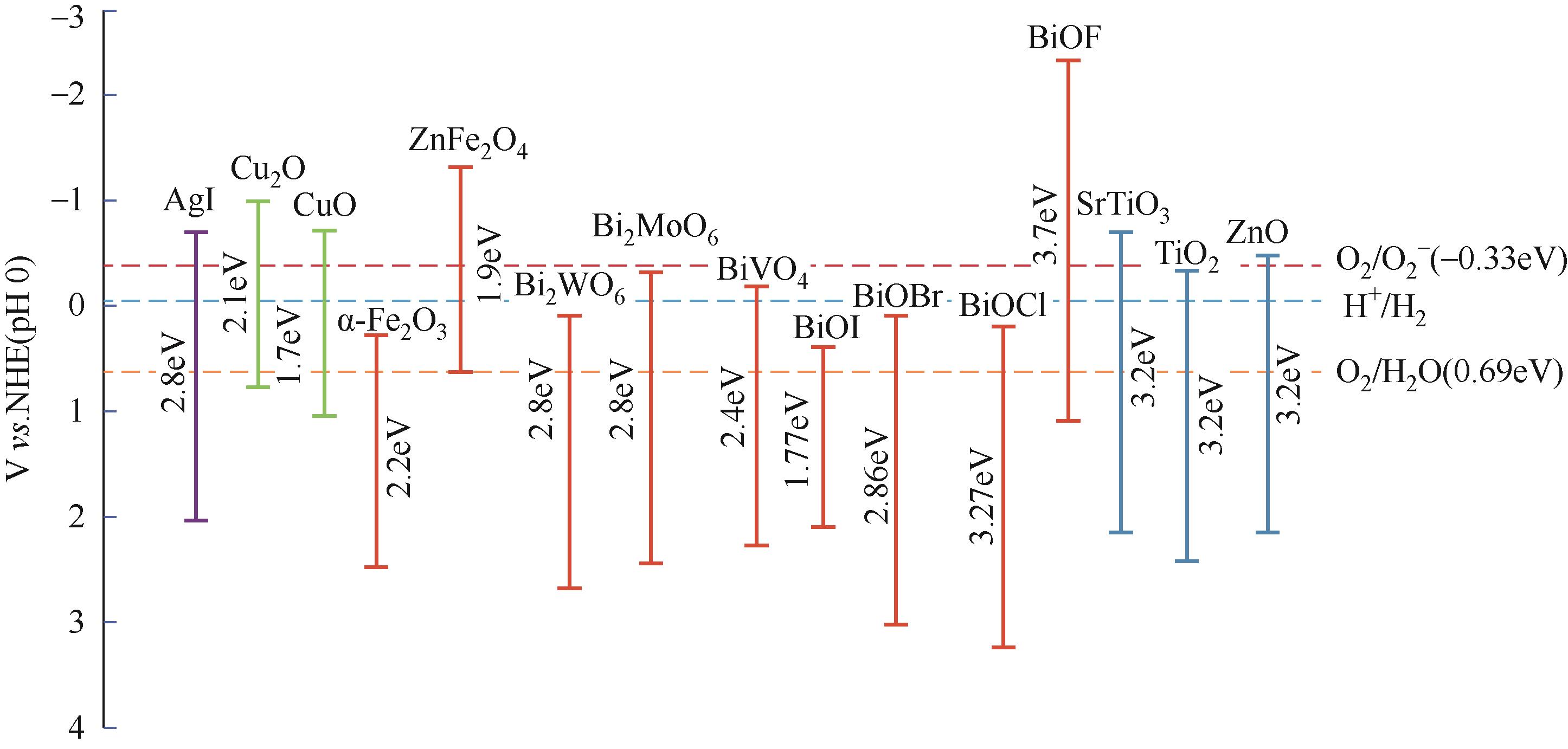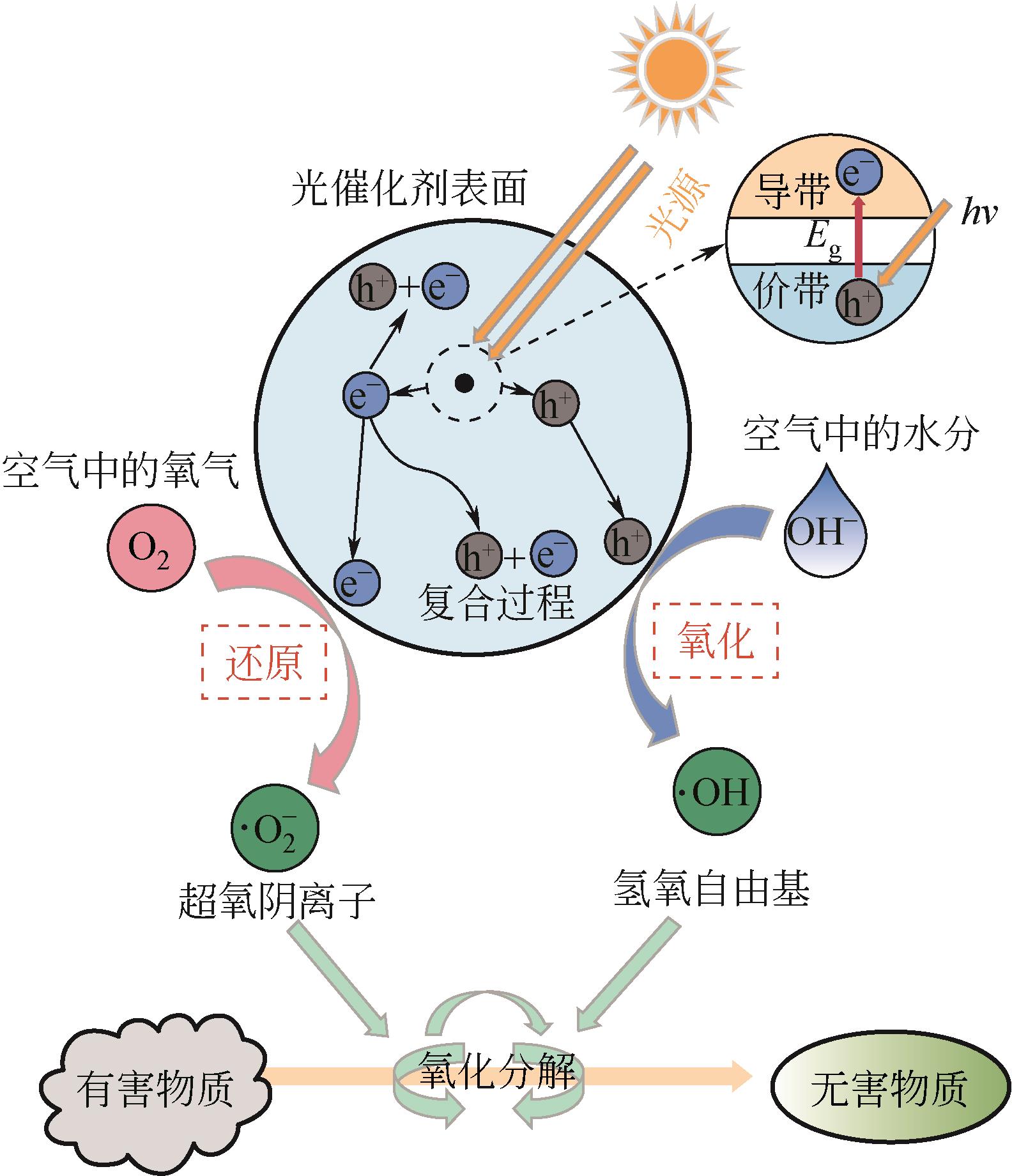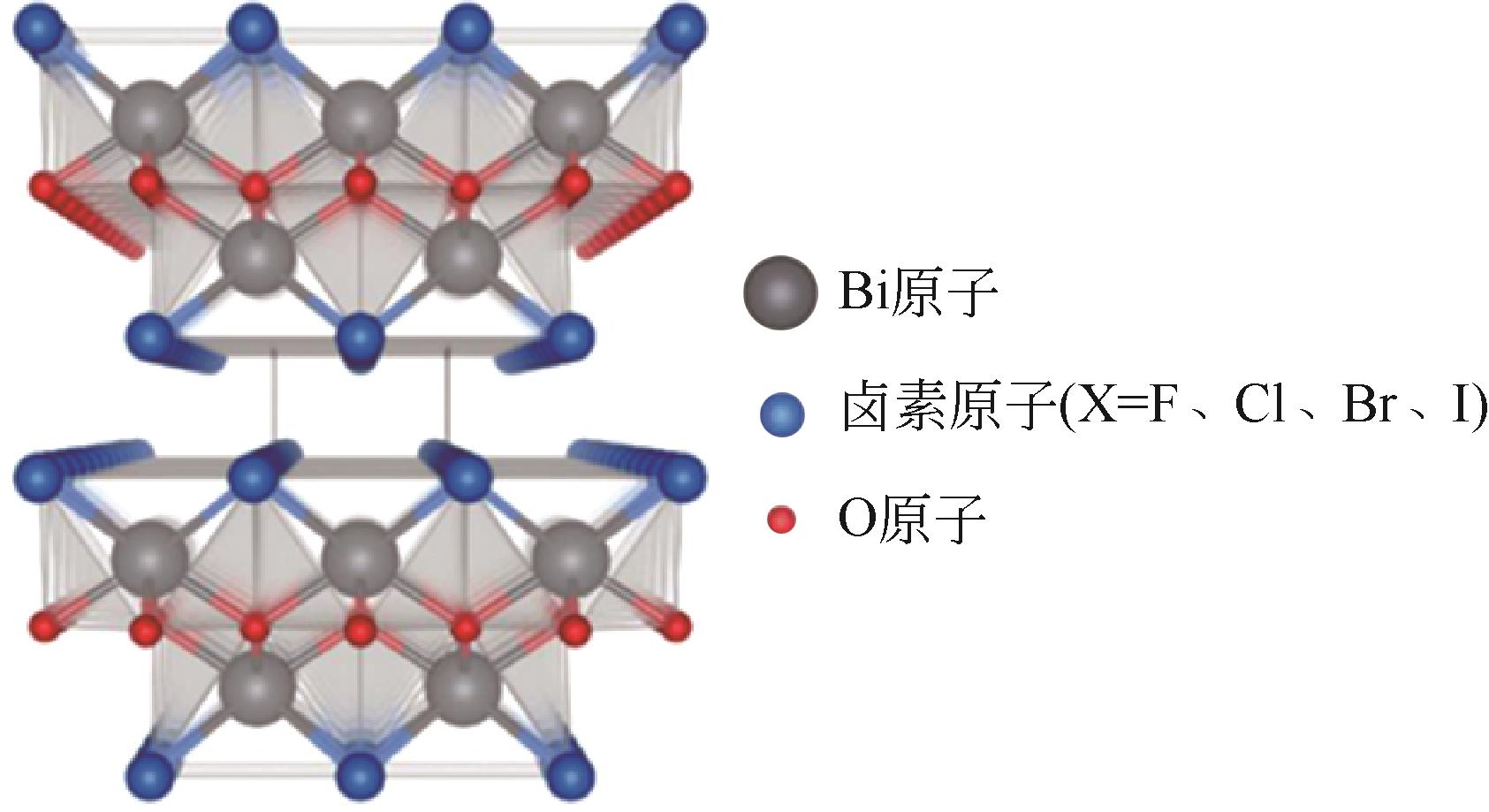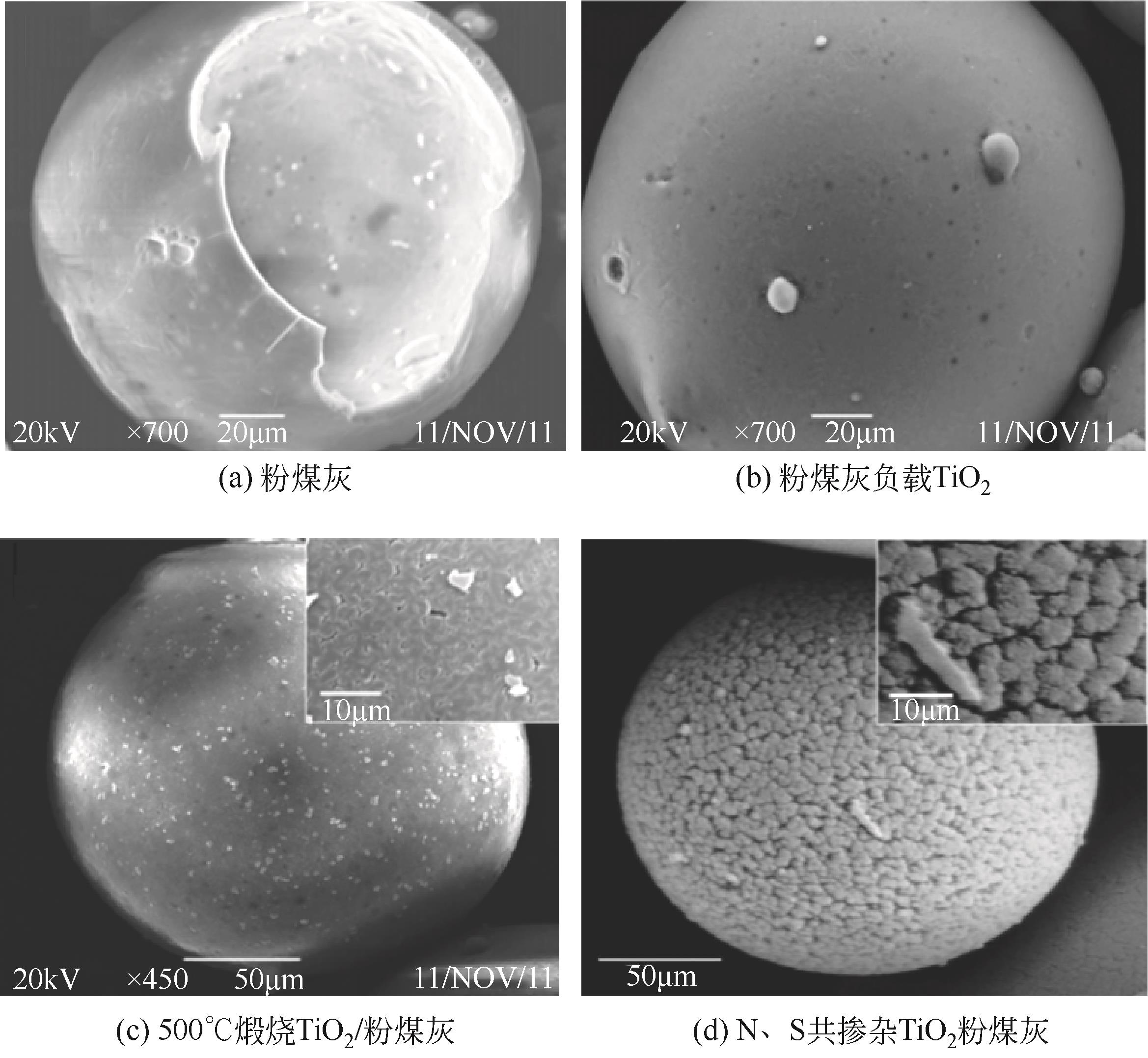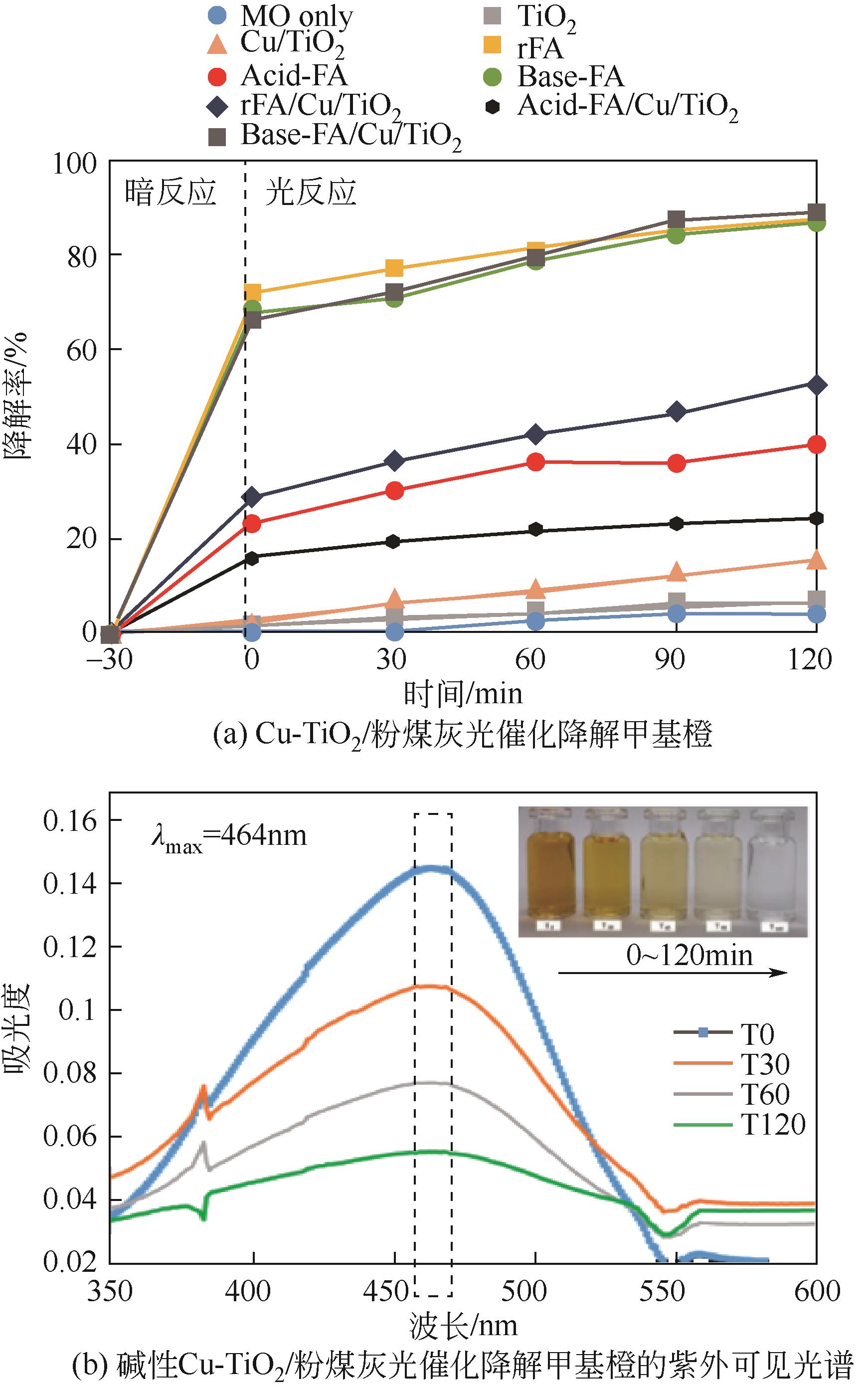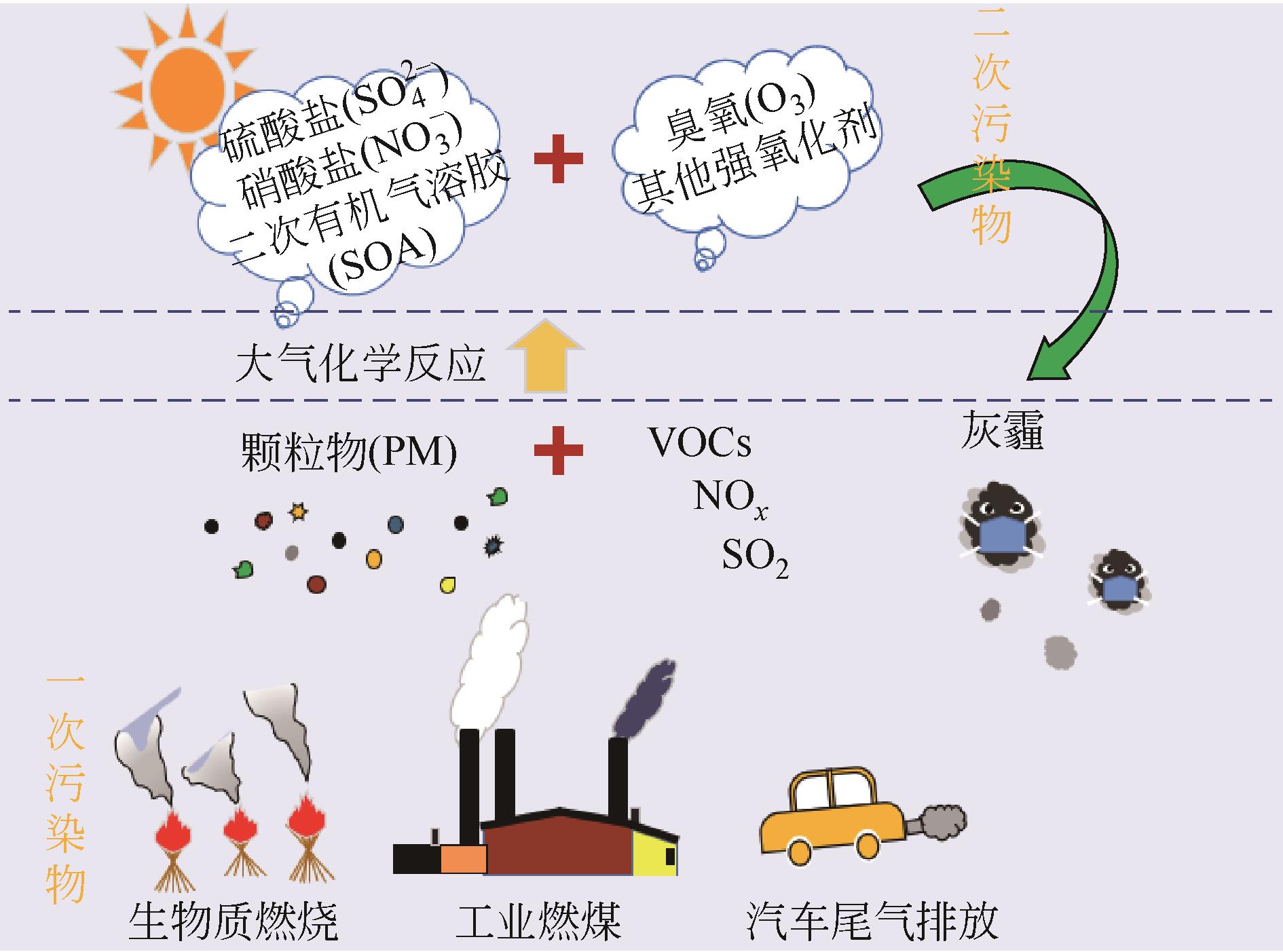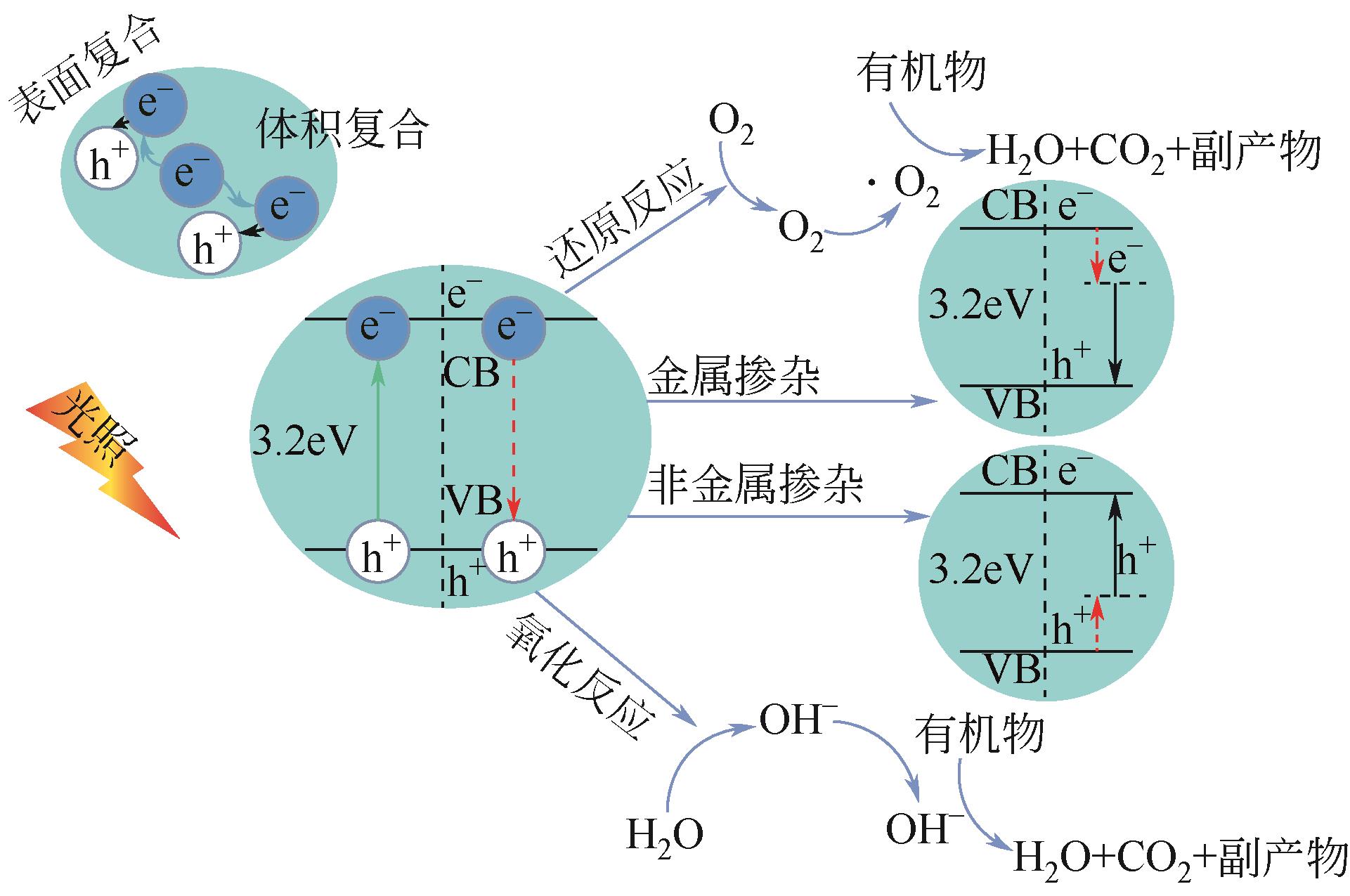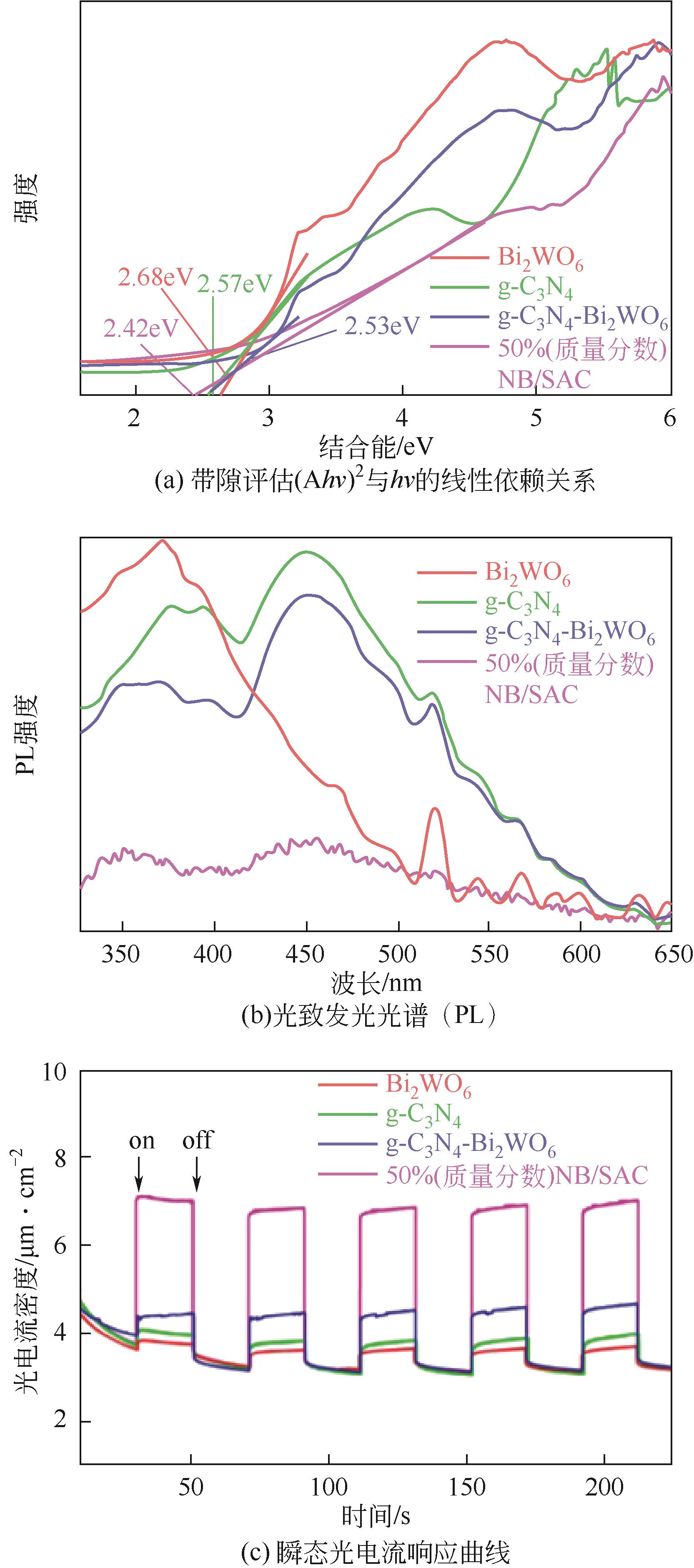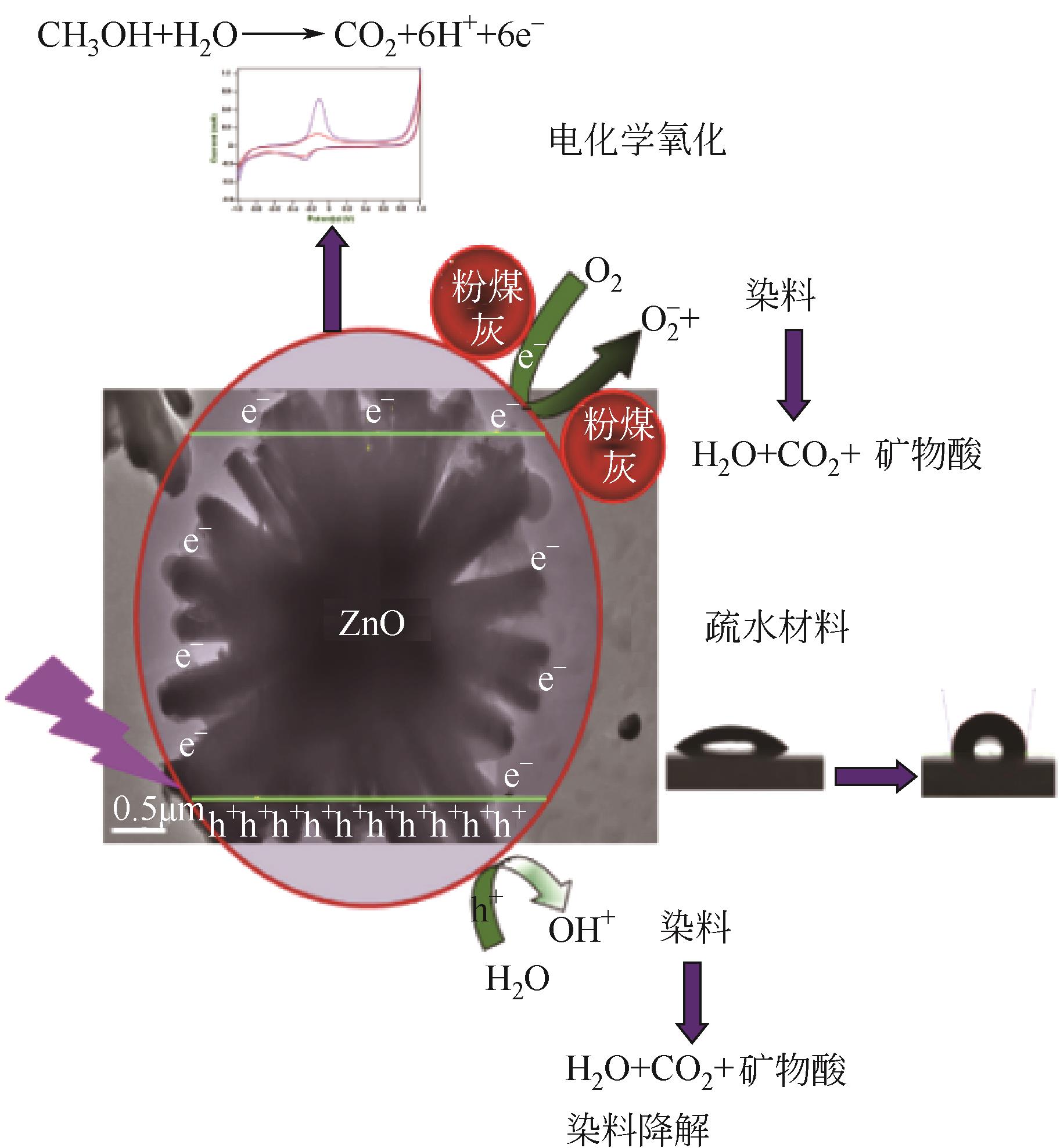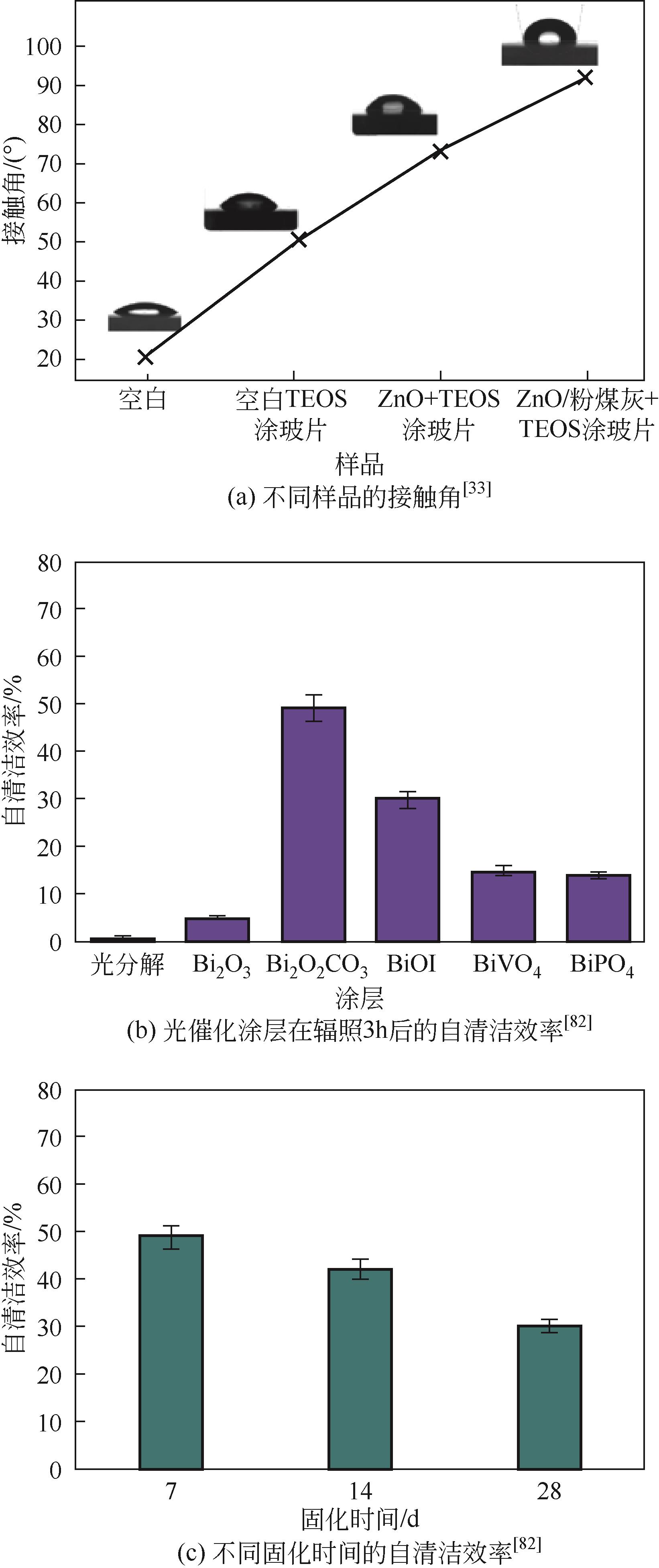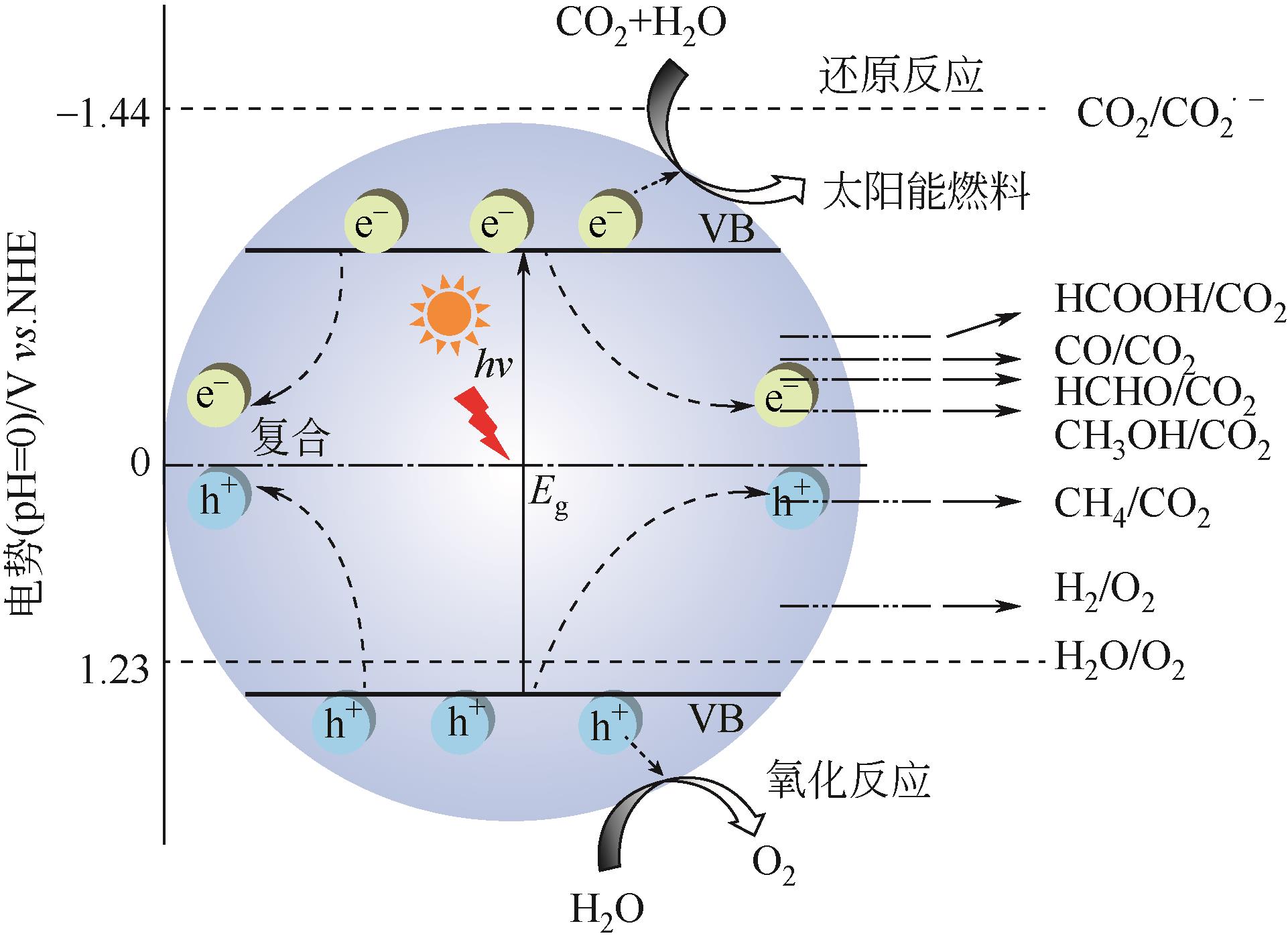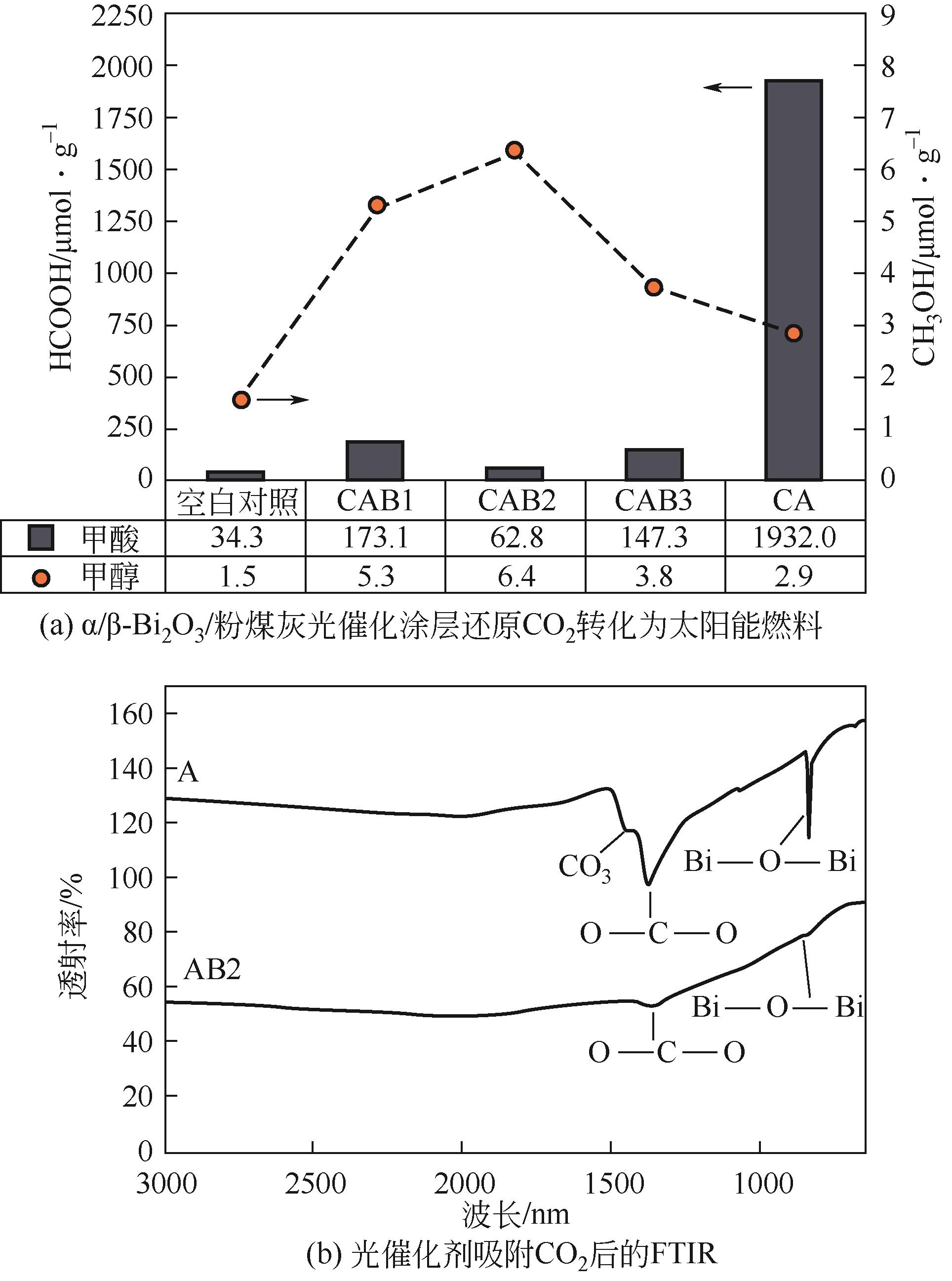化工进展 ›› 2024, Vol. 43 ›› Issue (7): 4043-4058.DOI: 10.16085/j.issn.1000-6613.2023-0990
粉煤灰负载光催化材料的研究进展
张世蕊( ), 范朕连, 宋慧平(
), 范朕连, 宋慧平( ), 张丽娜, 高宏宇, 程淑艳, 程芳琴
), 张丽娜, 高宏宇, 程淑艳, 程芳琴
- 山西大学资源与环境工程研究所,黄河流域资源增效减碳教育部工程研究中心,山西 太原 030600
-
收稿日期:2023-06-16修回日期:2023-08-12出版日期:2024-07-25发布日期:2024-08-14 -
通讯作者:宋慧平 -
作者简介:张世蕊(1998—),女,硕士研究生,研究方向为固废资源化利用。E-mail:1755203788@qq.com。 -
基金资助:山西省留学回国人员科技活动择优项目(20230005);国家自然科学基金(51874194);山西省黄河实验室科技攻关项目(YRL-202112);吕梁市引进高层次科技人才项目(2021RC-2-2)
Research progress of fly ash supported photocatalytic materials
ZHANG Shirui( ), FAN Zhenlian, SONG Huiping(
), FAN Zhenlian, SONG Huiping( ), ZHANG Lina, GAO Hongyu, CHENG Shuyan, CHENG Fangqin
), ZHANG Lina, GAO Hongyu, CHENG Shuyan, CHENG Fangqin
- Engineering Research Center of Ministry of Education for Resource Efficiency Enhancing and Carbon Emission Reduction in Yellow River Basin, Institute of Resources and Environmental Engineering, Shanxi University, Taiyuan 030600, Shanxi, China
-
Received:2023-06-16Revised:2023-08-12Online:2024-07-25Published:2024-08-14 -
Contact:SONG Huiping
摘要:
粉煤灰是煤炭燃烧最主要的固体废弃物,大量的堆积对人类身体健康及环境均造成了严重的威胁。基于粉煤灰的多孔结构和吸附性能,将其与纳米光催化材料复合可以达到分散和稳定光催化剂的效果,显著提高光催化活性,同时实现吸附与光催化的协同作用。本文主要围绕半导体光催化材料易团聚的问题,对近几年来国内外粉煤灰负载光催化材料的制备方法及应用进行了简要概述。首先,分析了粉煤灰的性质及改性方法,重点介绍了溶胶-凝胶法、水热法、液相沉淀法三种制备粉煤灰光催化复合材料的方法,并对比分析三种方法的优缺点,从水中污染物的降解,NO x 、VOCs气体污染物的降解以及自清洁性能,CO2还原性能等几方面的应用,分析了材料的性能和粉煤灰复合光催化剂的积极影响,表明粉煤灰主要作为吸附剂与载体参与其中。但是粉煤灰作为载体,其活性位点少,改性技术不够成熟,且研究还处于实验阶段,未能进行工程化生产,因此还需要不断完善粉煤灰改性技术,同时进一步研究附加粉煤灰负载光催化材料的功能性建筑材料,提高其实用性。
中图分类号:
引用本文
张世蕊, 范朕连, 宋慧平, 张丽娜, 高宏宇, 程淑艳, 程芳琴. 粉煤灰负载光催化材料的研究进展[J]. 化工进展, 2024, 43(7): 4043-4058.
ZHANG Shirui, FAN Zhenlian, SONG Huiping, ZHANG Lina, GAO Hongyu, CHENG Shuyan, CHENG Fangqin. Research progress of fly ash supported photocatalytic materials[J]. Chemical Industry and Engineering Progress, 2024, 43(7): 4043-4058.
| 参数 | 范围 | 平均值 |
|---|---|---|
| 密度/g·cm-3 | 1.9~2.9 | 2.1 |
| 原灰标准稠度/% | 27.3~66.7 | 48 |
| 需水量/% | 89~130 | 106 |
| 28d抗压强度比/% | 37~85 | 66 |
表1 粉煤灰的物理性质[16]
| 参数 | 范围 | 平均值 |
|---|---|---|
| 密度/g·cm-3 | 1.9~2.9 | 2.1 |
| 原灰标准稠度/% | 27.3~66.7 | 48 |
| 需水量/% | 89~130 | 106 |
| 28d抗压强度比/% | 37~85 | 66 |
| 参数 | 范围 | 平均值 |
|---|---|---|
| ω(SiO2) | 33.9~59.7 | 50.6 |
| ω(Al2O3) | 16.5~35.4 | 27.2 |
| ω(Fe2O3) | 1.50~6.22 | 6.2 |
| ω(CaO) | 0.8~9.4 | 2.8 |
| ω(MgO) | 0.7~1.9 | 1.2 |
| ω(K2O) | 0.7~2.9 | 1.3 |
表2 粉煤灰的化学组成[16]
| 参数 | 范围 | 平均值 |
|---|---|---|
| ω(SiO2) | 33.9~59.7 | 50.6 |
| ω(Al2O3) | 16.5~35.4 | 27.2 |
| ω(Fe2O3) | 1.50~6.22 | 6.2 |
| ω(CaO) | 0.8~9.4 | 2.8 |
| ω(MgO) | 0.7~1.9 | 1.2 |
| ω(K2O) | 0.7~2.9 | 1.3 |
| 项目 | TiO2 | ZnO | BiOX(X=F、Cl、Br、I) | α-Fe2O3 | g-C3N4 | |||
|---|---|---|---|---|---|---|---|---|
| BiOF | BiOCl | BiOBr | BiOI | |||||
| 禁带宽度/eV | 3.2 | 3.2 | 3.6 | 3.5 | 2.6 | 1.8~1.9 | 2.0~2.2 | 2.7 |
| 优点 | 化学稳定性好;抗光腐蚀能力强 | 化学稳定性好;抗光腐蚀能力强 | 具有特殊稳定的晶型结构;具有可见光响应性能;光催化活性高 | 具有高化学稳定性;耐酸碱性;耐光腐蚀;无毒廉价;具有可见光响应性能 | 化学稳定性好;具有可见光响应性能;制备方法简单;无重金属污染 | |||
| 缺点 | 仅对紫外光有响应;光生载流子复合率高 | 仅对紫外光有响应;光生载流子复合率高 | 可见光的能量较低;光生载流子复合率高 | 光生载流子复合率高;光催化活性低 | 光生载流子复合率高;比表面积低;可见光利用率低 | |||
表3 常见光催化材料
| 项目 | TiO2 | ZnO | BiOX(X=F、Cl、Br、I) | α-Fe2O3 | g-C3N4 | |||
|---|---|---|---|---|---|---|---|---|
| BiOF | BiOCl | BiOBr | BiOI | |||||
| 禁带宽度/eV | 3.2 | 3.2 | 3.6 | 3.5 | 2.6 | 1.8~1.9 | 2.0~2.2 | 2.7 |
| 优点 | 化学稳定性好;抗光腐蚀能力强 | 化学稳定性好;抗光腐蚀能力强 | 具有特殊稳定的晶型结构;具有可见光响应性能;光催化活性高 | 具有高化学稳定性;耐酸碱性;耐光腐蚀;无毒廉价;具有可见光响应性能 | 化学稳定性好;具有可见光响应性能;制备方法简单;无重金属污染 | |||
| 缺点 | 仅对紫外光有响应;光生载流子复合率高 | 仅对紫外光有响应;光生载流子复合率高 | 可见光的能量较低;光生载流子复合率高 | 光生载流子复合率高;光催化活性低 | 光生载流子复合率高;比表面积低;可见光利用率低 | |||
| 制备方法 | 光催化材料 | 目标降解物 | 降解效率 | 优缺点 | 参考文献 |
|---|---|---|---|---|---|
| 溶胶-凝胶法 | Fe3+-TiO2/粉煤灰 | 亚甲基蓝 | 加入粉煤灰后降解率提高了30%左右 | 反应简单且易控制;反应均匀;薄膜容易发生龟裂;易团聚 | [ |
| TiO2-磁性Fe3O4/粉煤灰漂珠 | 盐酸恩诺沙星 | 75.32%,60min | [ | ||
| TiO2/粉煤灰多孔陶瓷 | 亚甲基蓝 | 50%左右,240min | [ | ||
| BiOBr-BiOI/粉煤灰 | — | 99%,70 min | [ | ||
| Cu-TiO2/粉煤灰 | 甲基橙 | 可见光:99.1%,2h,紫外光可实现完全降解 | [ | ||
| 水热法 | TiO2/粉煤灰珠 | 罗丹明B | 99%,90min | 样品性能良好(结晶性好、尺寸小、分散性好);可控制颗粒的晶型;需要高温高压 | [ |
| ZnO/粉煤灰 | 氮染料活性橙4、罗丹明B和台盼蓝 | 98%,90min | [ | ||
| CoFe2O4/粉煤灰 | 亚甲基蓝 | 99%,60min | [ | ||
| TiO2/粉煤灰基X沸石 | NO | 75%,60min | [ | ||
| 液相沉淀法 | ZnCr层状双氧化物/粉煤灰 | 环丙沙星 | 98%,120 min | 制备方法简单;样品成分均匀 | [ |
| N、S共掺杂TiO2/粉煤灰漂珠 | 甲基橙 | 65%,60min | [ | ||
| Ag2O-TiO2/FACs | 亚甲基蓝 | 100%,30min | [ | ||
| TiO2-Cu x S/粉煤灰 | 亚甲基蓝 | 99%,360min | [ |
表4 光催化材料制备方法对比
| 制备方法 | 光催化材料 | 目标降解物 | 降解效率 | 优缺点 | 参考文献 |
|---|---|---|---|---|---|
| 溶胶-凝胶法 | Fe3+-TiO2/粉煤灰 | 亚甲基蓝 | 加入粉煤灰后降解率提高了30%左右 | 反应简单且易控制;反应均匀;薄膜容易发生龟裂;易团聚 | [ |
| TiO2-磁性Fe3O4/粉煤灰漂珠 | 盐酸恩诺沙星 | 75.32%,60min | [ | ||
| TiO2/粉煤灰多孔陶瓷 | 亚甲基蓝 | 50%左右,240min | [ | ||
| BiOBr-BiOI/粉煤灰 | — | 99%,70 min | [ | ||
| Cu-TiO2/粉煤灰 | 甲基橙 | 可见光:99.1%,2h,紫外光可实现完全降解 | [ | ||
| 水热法 | TiO2/粉煤灰珠 | 罗丹明B | 99%,90min | 样品性能良好(结晶性好、尺寸小、分散性好);可控制颗粒的晶型;需要高温高压 | [ |
| ZnO/粉煤灰 | 氮染料活性橙4、罗丹明B和台盼蓝 | 98%,90min | [ | ||
| CoFe2O4/粉煤灰 | 亚甲基蓝 | 99%,60min | [ | ||
| TiO2/粉煤灰基X沸石 | NO | 75%,60min | [ | ||
| 液相沉淀法 | ZnCr层状双氧化物/粉煤灰 | 环丙沙星 | 98%,120 min | 制备方法简单;样品成分均匀 | [ |
| N、S共掺杂TiO2/粉煤灰漂珠 | 甲基橙 | 65%,60min | [ | ||
| Ag2O-TiO2/FACs | 亚甲基蓝 | 100%,30min | [ | ||
| TiO2-Cu x S/粉煤灰 | 亚甲基蓝 | 99%,360min | [ |
| 光催化材料 | 光源 | 制备方法 | 目标降解物及降解效率 | 参考文献 |
|---|---|---|---|---|
| 聚吡咯(PPy)-TiO2/粉煤灰 | 可见光 | — | 亚甲基蓝; 75%,5h,循环4次仍能保持70%左右 | [ |
| Cu-TiO2/粉煤灰 | 紫外光/可见光 | 溶胶-凝胶法 | 甲基橙; 可见光:99.1%,2h, 紫外光可实现完全降解 | [ |
| BiOBr-BiOI/粉煤灰 | 蓝色LED灯 | 水热法 | 罗丹明B; 99%,70min,循环5次后仍达90% | [ |
| Ag-TiO2/粉煤灰 | 可见光 | 溶胶-凝胶法 | 活性染料; 85%~95%,3~4h | [ |
| TiO2/粉煤灰微球 | 可见光 | 水热法 | 罗丹明B; 99%,90min | [ |
| ZnCr层状双氧化物/粉煤灰 | 模拟太阳光 | 简单沉淀法 | 环丙沙星; 98%,120min | [ |
表5 光催化降解水中污染物
| 光催化材料 | 光源 | 制备方法 | 目标降解物及降解效率 | 参考文献 |
|---|---|---|---|---|
| 聚吡咯(PPy)-TiO2/粉煤灰 | 可见光 | — | 亚甲基蓝; 75%,5h,循环4次仍能保持70%左右 | [ |
| Cu-TiO2/粉煤灰 | 紫外光/可见光 | 溶胶-凝胶法 | 甲基橙; 可见光:99.1%,2h, 紫外光可实现完全降解 | [ |
| BiOBr-BiOI/粉煤灰 | 蓝色LED灯 | 水热法 | 罗丹明B; 99%,70min,循环5次后仍达90% | [ |
| Ag-TiO2/粉煤灰 | 可见光 | 溶胶-凝胶法 | 活性染料; 85%~95%,3~4h | [ |
| TiO2/粉煤灰微球 | 可见光 | 水热法 | 罗丹明B; 99%,90min | [ |
| ZnCr层状双氧化物/粉煤灰 | 模拟太阳光 | 简单沉淀法 | 环丙沙星; 98%,120min | [ |
| 1 | 李树志, 李学良, 尹大伟. 碳中和背景下煤炭矿山生态修复的几个基本问题[J]. 煤炭科学技术, 2022, 50(1): 286-292. |
| LI Shuzhi, LI Xueliang, YIN Dawei. Several basic issues of ecological restoration of coal mines under background of carbon neutrality[J]. Coal Science and Technology, 2022, 50(1): 286-292. | |
| 2 | LI Quansheng. The view of technological innovation in coal industry under the vision of carbon neutralization[J]. International Journal of Coal Science & Technology, 2021, 8(6): 1197-1207. |
| 3 | DING Jian, MA Shuhua, SHEN Shirley, et al. Research and industrialization progress of recovering alumina from fly ash: A concise review[J]. Waste Management, 2017, 60: 375-387. |
| 4 | 张祥成, 孟永彪. 浅析中国粉煤灰的综合利用现状[J]. 无机盐工业, 2020, 52(2): 1-5. |
| ZHANG Xiangcheng, MENG Yongbiao. Brief analysis on present situation of comprehensive utilization of fly ash in China[J]. Inorganic Chemicals Industry, 2020, 52(2): 1-5. | |
| 5 | KUMAR Kuldeep, KUMAR Ashok. Empirical use of fly ash for rhizobial population and yield of some legume crops for sustainable agriculture[J].Biomass Conversion and Biorefinery, 2023, 13(17): 15421-15433. |
| 6 | TAKANABE Kazuhiro. Photocatalytic water splitting: Quantitative approaches toward photocatalyst by design[J]. ACS Catalysis, 2017, 7(11): 8006-8022. |
| 7 | GUO Qingfeng, SUN Hongrui, ZHANG Liying, et al. Cotton fabric-based RGO/BiVO4 recyclable photocatalytic nanocomposites for dye degradation under visible light[J]. Composites Communications, 2021, 27: 100846. |
| 8 | ZHANG Fubao, WANG Xianming, LIU Haonan, et al. Recent advances and applications of semiconductor photocatalytic technology[J]. Applied Sciences, 2019, 9(12): 2489. |
| 9 | TU Hu, LI Dan, YI Yang, et al. Incorporation of rectorite into porous polycaprolactone/TiO2 nanofibrous mats for enhancing photocatalysis properties towards organic dye pollution[J]. Composites Communications, 2019, 15: 58-63. |
| 10 | NI Yongheng, YAN Kun, XU Feiyang, et al. Synergistic effect on TiO2 doped poly (vinyl alcohol-co-ethylene) nanofibrous film for filtration and photocatalytic degradation of methylene blue[J]. Composites Communications, 2019, 12: 112-116. |
| 11 | MAGNONE Edoardo, KIM Min-Kwang, LEE Hong Joo, et al. Testing and substantial improvement of TiO2/UV photocatalysts in the degradation of Methylene Blue[J]. Ceramics International, 2019, 45(3): 3359-3367. |
| 12 | VIBULYASEAK Kasimanat Guy), DEEPRACHA Siwada Benz), OGAWA Makoto. Immobilization of titanium dioxide in mesoporous silicas: Structural design and characterization[J]. Journal of Solid State Chemistry, 2019, 270: 162-172. |
| 13 | WANG Bing, LI Qin, WANG Wei, et al. Preparation and characterization of Fe3+-doped TiO2 on fly ash cenospheres for photocatalytic application[J]. Applied Surface Science, 2011, 257(8): 3473-3479. |
| 14 | FUKASAWA Tomonori, KARISMA Achmad Dwitama, SHIBATA Daiki, et al. Synthesis of zeolite from coal fly ash by microwave hydrothermal treatment with pulverization process[J]. Advanced Powder Technology, 2017, 28(3): 798-804. |
| 15 | 赵泽森, 崔莉, 郭彦霞, 等. 粉煤灰中战略金属镓的提取与回收研究进展[J]. 化工学报, 2021, 72(6): 3239-3251. |
| ZHAO Zesen, CUI Li, GUO Yanxia, et al. Research progress on extraction and recovery of strategic metal gallium from coal fly ash[J]. CIESC Journal, 2021, 72(6): 3239-3251. | |
| 16 | 宋伟涛, 宋慧平, 范朕连, 等. 粉煤灰在防腐涂料中的研究进展[J]. 化工进展, 2023, 42(9): 4894-4904. |
| SONG Weitao, SONG Huiping, FAN Zhenlian, et al. Research progress of fly ash in anticorrosive coatings[J]. Progress in Chemical Industry, 2023, 42(9): 4894-4904. | |
| 17 | CHUAICHAM Chitiphon, INOUE Takumi, BALAKUMAR Vellaichamy, et al. Visible light-driven ZnCr double layer oxide photocatalyst composites with fly ashes for the degradation of ciprofloxacin[J]. Journal of Environmental Chemical Engineering, 2022, 10(1): 106970. |
| 18 | BRADLEY Robert H. Recent developments in the physical adsorption of toxic organic vapours by activated carbons[J]. Adsorption Science & Technology, 2011, 29(1): 1-28. |
| 19 | KAEWMEE Patcharanat, SONG Mengzhu, IWANAMI Mitsuyasu, et al. Porous and reusable potassium-activated geopolymer adsorbent with high compressive strength fabricated from coal fly ash wastes[J]. Journal of Cleaner Production, 2020, 272: 122617. |
| 20 | ILERI Burcu, SANLIYUKSEL YUCEL Deniz. Metal removal from acid mine lake using ultrasound-assisted modified fly ash at different frequencies[J].Environmental Monitoring and Assessment, 2020, 192(3): 1-18. |
| 21 | YANG Guiyun, REN Qiangqiang, XU Jing, et al. Co-melting properties and mineral transformation behavior of mixtures by MSWI fly ash and coal ash[J]. Journal of the Energy Institute, 2021, 96: 148-157. |
| 22 | 王伟, 龙悦, 吕鹏刚. 粉煤灰改性为水处理化学品的研究进展[J]. 精细与专用化学品, 2017, 25(7): 35-37. |
| WANG Wei, LONG Yue, Penggang LYU. Research progress on modified cocl ash as water management chemicals[J]. Fine and Specialty Chemicals, 2017, 25(7): 35-37. | |
| 23 | 张鹏, 李大鹏, 马军涛. 粉煤灰基催化剂在环境污染物治理方面的应用[J]. 环境科学与技术, 2021, 44(7): 180-188. |
| ZHANG Peng, LI Dapeng, MA Juntao. Application of fly ash-based catalysts in the environmental pollutants control[J]. Environmental Science & Technology, 2021, 44(7): 180-188. | |
| 24 | FUJISHIMA A, HONDA K. Photocatalysis-decomposition of water at the surface of an irradiated semiconductoe[J]. Nature, 1972, 238(5383): 37-38. |
| 25 | CAREY John H, LAWRENCE John, TOSINE Helle M. Photodechlorination of PCB’s in the presence of titanium dioxide in aqueous suspensions[J]. Bulletin of Environmental Contamination and Toxicology, 1976, 16(6): 697-701. |
| 26 | PI Yunhong, LI Xiyi, XIA Qibin, et al. Adsorptive and photocatalytic removal of Persistent Organic Pollutants (POPs) in water by metal-organic frameworks (MOFs)[J]. Chemical Engineering Journal, 2018, 337: 351-371. |
| 27 | HAGFELDT Anders, WALDER Lorenz, GRAETZEL Michael. Nanostructured TiO2 semiconductor electrodes modified with surface-attached viologens: Applications for displays and smart windows[J]. Proceedings of Spie the International Society for Optical Engineering, 1995, 2531: 1-10. |
| 28 | KUDO Akihiko, MISEKI Yugo. Heterogeneous photocatalyst materials for water splitting[J]. Chemical Society Reviews, 2009, 38(1): 253-278. |
| 29 | LIANG Shijing, WANG Jiangpeng, WU Xiuqin, et al. Phase transformation synthesis of a new Bi2SeO5 flower-like microsphere for efficiently photocatalytic degradation of organic pollutants[J]. Catalysis Today, 2019, 327: 357-365. |
| 30 | YANG Yajing, BIAN Zhaoyong. Oxygen doping through oxidation causes the main active substance in g-C3N4 photocatalysis to change from holes to singlet oxygen[J]. Science of the Total Environment, 2021, 753: 141908. |
| 31 | CHANG Fei, LEI Bin, ZHANG Xiaoya, et al. The reinforced photocatalytic performance of binary-phased composites Bi-Bi12O17Cl2 fabricated by a facile chemical reduction protocol[J]. Colloids and Surfaces A: Physicochemical and Engineering Aspects, 2019, 572: 290-298. |
| 32 | XU Hua, OUYANG Shuxin, LIU Lequan, et al. Recent advances in TiO2-based photocatalysis[J]. Journal of Materials Chemistry A, 2014, 2(32): 12642-12661. |
| 33 | THIRUMALAI Kuppulingam, BALACHANDRAN Subramanian, SWAMINATHAN Meenakshisundaram. Superior photocatalytic, electrocatalytic, and self-cleaning applications of fly ash supported ZnO nanorods[J]. Materials Chemistry and Physics, 2016, 183: 191-200. |
| 34 | WANG Zhiyu, LUAN Deyan, MADHAVI Srinivasan, et al. Assembling carbon-coated α-Fe2O3 hollow nanohorns on the CNT backbone for superior lithium storage capability[J]. Energy & Environmental Science, 2012, 5(1): 5252-5256. |
| 35 | WANG Yingying, YANG Wenjuan, CHEN Xianjie, et al. Photocatalytic activity enhancement of core-shell structure g-C3N4@TiO2 via controlled ultrathin g-C3N4 layer[J]. Applied Catalysis B: Environmental, 2018, 220: 337-347. |
| 36 | LI Yunfeng, XIA Zhiling, YANG Qing, et al. Review on g-C3N4-based S-scheme heterojunction photocatalysts[J]. Journal of Materials Science & Technology, 2022, 125: 128-144. |
| 37 | HE Rong'an, CAO Shaowen, ZHOU Peng, et al. Recent advances in visible light Bi-based photocatalysts[J]. Chinese Journal of Catalysis, 2014, 35(7): 989-1007. |
| 38 | SHEHU Imam Saifullahi, ROHANA Adnan, HAIDA Mohd KAUS Noor. The photocatalytic potential of BiOBr for wastewater treatment: A mini-review[J]. Journal of Environmental Chemical Engineering, 2021, 9(4): 105404. |
| 39 | GANOSE Alex M, CUFF Madeleine, BUTLER Keith T, et al. Interplay of orbital and relativistic effects in bismuth oxyhalides: BiOF, BiOCl, BiOBr, and BiOI[J]. Chemistry of Materials: a Publication of the American Chemical Society, 2016, 28(7): 1980-1984. |
| 40 | UNWISET Preeya, MAKDEE Ammarika, CHANAPATTHARAPOL Kingkaew Chayakul, et al. Effect of Cu addition on TiO2 surface properties and photocatalytic performance: X-ray absorption spectroscopy analysis[J]. Journal of Physics and Chemistry of Solids, 2018, 120: 231-240. |
| 41 | Beatriz PAVA-GÓMEZ, Ximena VARGAS-RAMÍREZ, Carlos DÍAZ-URIBE. Physicochemical study of adsorption and photodegradation processes of methylene blue on copper-doped TiO2 films[J]. Journal of Photochemistry and Photobiology A: Chemistry, 2018, 360: 13-25. |
| 42 | Gladis PEDROZA-HERRERA, MEDINA-RAMÍREZ Iliana E, LOZANO-ÁLVAREZ Juan Antonio, et al. Evaluation of the photocatalytic activity of copper doped TiO2 nanoparticles for the purification and/or disinfection of industrial effluents[J]. Catalysis Today, 2020, 341: 37-48. |
| 43 | WU Ming-Chung, WU Po-Yeh, LIN Tinghan, et al. Photocatalytic performance of Cu-doped TiO2 nanofibers treated by the hydrothermal synthesis and air-thermal treatment[J]. Applied Surface Science, 2018, 430: 390-398. |
| 44 | SHAFEI A, SHEIBANI S. Visible light photocatalytic activity of Cu doped TiO2-CNT nanocomposite powder prepared by Sol–gel method[J]. Materials Research Bulletin, 2019, 110: 198-206. |
| 45 | KANAKARAJU Devagi, Muhamad Hazim BIN YA, Ying-Chin LIM, et al. Combined adsorption/photocatalytic dye removal by copper-titania-fly ash composite[J]. Surfaces and Interfaces, 2020, 19: 100534. |
| 46 | LU Ziyang, ZHOU Weichao, HUO Pengwei, et al. Performance of a novel TiO2 photocatalyst based on the magnetic floating fly-ash cenospheres for the purpose of treating waste by waste[J]. Chemical Engineering Journal, 2013, 225: 34-42. |
| 47 | ÖZCAN MÜCAHID, BURAK Birol, FIGEN Kaya. Investigation of photocatalytic properties of TiO2 nanoparticle coating on fly ash and red mud based porous ceramic substrate[J]. Ceramics International, 2021, 47(17): 24270-24280. |
| 48 | LIN Li, HUANG Manhong, CHEN Donghui. BiOBr/BiOI photocatalyst based on fly ash cenospheres with improved photocatalytic performance[J]. Molecules, 2016, 21(5): 666. |
| 49 | YANG Lu, WANG Fazhou, HAKKI Amer, et al. The influence of zeolites fly ash bead/TiO2 composite material surface morphologies on their adsorption and photocatalytic performance[J]. Applied Surface Science, 2017, 392: 687-696. |
| 50 | NADEEM Nimra, YASEEN Muhammad, AHMAD REHAN Zulfiqar, et al. Coal fly ash supported CoFe2O4 nanocomposites: Synergetic Fenton-like and photocatalytic degradation of methylene blue[J]. Environmental Research, 2022, 206: 112280. |
| 51 | 韩建丽, 王连勇, 杨义凡. 粉煤灰基TiO2/X沸石制备及其光催化氧化NO[J]. 材料与冶金学报, 2022, 21(3): 184-188. |
| HAN Jianli, WANG Lianyong, YANG Yifan. Preparation of fly ash based TiO2/X zeolite and its photocatalytic oxidation NO[J]. Journal of Materials and Metallurgy, 2022, 21(3): 184-188. | |
| 52 | Jun LYU, SHENG Tong, SU Lili, et al. N,S co-doped-TiO2/fly ash beads composite material and visible light photocatalytic activity[J]. Applied Surface Science, 2013, 284: 229-234. |
| 53 | SHI Tengteng, HAO Xiangyang, MA Jiayi, et al. Preparation of Ag2O/TiO2/fly-ash cenospheres composite photocatalyst[J]. Materials Letters, 2016, 183: 444-447. |
| 54 | ANDRONIC Luminita, ISAC Luminita, CAZAN Cristina, et al. Simultaneous adsorption and photocatalysis processes based on ternary TiO2-Cu x S-fly ash hetero-structures[J]. Applied Sciences, 2020, 10(22): 8070. |
| 55 | MINAS Fenta, CHANDRAVANSHI B, LETA S. Chemical precipitation method for chromium removal and its recovery from tannery wastewater in Ethiopia[J]. Chemistry International, 2018, 3(4): 291-305. |
| 56 | MICHEL Magdalena, TYTKOWSKA Marta, RECZEK Lidia, et al. Technological conditions for the coagulation of wastewater from cosmetic industry[J]. Journal of Ecological Engineering, 2019, 20(5): 78-85. |
| 57 | REZAKAZEMI Mashallah, KHAJEH Afsaneh, MESBAH Mohammad. Membrane filtration of wastewater from gas and oil production[J]. Environmental Chemistry Letters, 2018, 16(2): 367-388. |
| 58 | CHENG Yunlang, ZHANG Miao, YAO Guang, et al. Band gap manipulation of cerium doping TiO2 nanopowders by hydrothermal method[J]. Journal of Alloys and Compounds, 2016, 662: 179-184. |
| 59 | Hüseyin KARACA, Esra ALTıNTıĞ, Devrim TÜRKER, et al. An evaluation of coal fly ash as an adsorbent for the removal of methylene blue from aqueous solutions: Kinetic and thermodynamic studies[J]. Journal of Dispersion Science and Technology, 2018, 39(12): 1800-1807. |
| 60 | MUSHTAQ Farwa, ZAHID Muhammad, AHMAD BHATTI Ijaz, et al. Possible applications of coal fly ash in wastewater treatment[J]. Journal of Environmental Management, 2019, 240: 27-46. |
| 61 | WANG Bing, LI Chuang, PANG Jianfeng, et al. Novel polypyrrole-sensitized hollow TiO2/fly ash cenospheres: Synthesis, characterization, and photocatalytic ability under visible light[J]. Applied Surface Science, 2012, 258(24): 9989-9996. |
| 62 | PATIL Bhumika P, JAYARAM Radha V. Photocatalytic degradation of reactive dyes using flyash supported Ag-TiO2 photocatalysts[J]. Chemistry Select, 2022, 7(5): 1-15. |
| 63 | CHEN Feng, ZOU Weiwei, QU Wenwu, et al. Photocatalytic performance of a visible light TiO2 photocatalyst prepared by a surface chemical modification process[J]. Catalysis Communications, 2009, 10(11): 1510-1513. |
| 64 | MALENGREAUX Charline M, PIRARD Sophie L, Géraldine LÉONARD, et al. Study of the photocatalytic activity of Fe3+, Cr3+, La3+ and Eu3+ single-doped and co-doped TiO2 catalysts produced by aqueous Sol-gel processing[J]. Journal of Alloys and Compounds, 2017, 69: 726-738. |
| 65 | WANG Lizhuo, ZHAO Jinhui, LIU Huimin, et al. Design, modification and application of semiconductor photocatalysts[J]. Journal of the Taiwan Institute of Chemical Engineers, 2018, 93: 590-602. |
| 66 | Jennyfer DIAZ-ANGULO, Jose LARA-RAMOS, MUESES Miguel, et al. Enhancement of the oxidative removal of diclofenac and of the TiO2 rate of photon absorption in dye-sensitized solar pilot scale CPC photocatalytic reactors[J]. Chemical Engineering Journal, 2020, 381: 122520. |
| 67 | MEDINETS Sergiy, SKIBA Ute, RENNENBERG Heinz, et al. A review of soil NO transformation: Associated processes and possible physiological significance on organisms[J]. Soil Biology and Biochemistry, 2015, 80: 92-117. |
| 68 | LI Nan, WANG Chuanyi, ZHANG Ke, et al. Progress and prospects of photocatalytic conversion of low-concentration NO x [J]. Chinese Journal of Catalysis, 2022, 43(9): 2363-2387. |
| 69 | HUANG Yu, AI Zhihui, Wingkei HO, et al. Ultrasonic spray pyrolysis synthesis of porous Bi2WO6 microspheres and their visible-light-induced photocatalytic removal of NO[J]. The Journal of Physical Chemistry C, 2010, 114(14): 6342-6349. |
| 70 | TAHIR Muhammad Suleman, MANZOOR Numair, SAGIR Muhammad, et al. RETRACTED: Fabrication of ZnFe2O4 modified TiO2 hybrid composites for photocatalytic reduction of CO2 into methanol[J]. Fuel, 2021, 285: 119206. |
| 71 | LIU Dongni, CHEN Dongyun, LI Najun, et al. Integration of 3D macroscopic graphene aerogel with 0D-2D AgVO3-g-C3N4 heterojunction for highly efficient photocatalytic oxidation of nitric oxide[J]. Applied Catalysis B: Environmental, 2019, 243: 576-584. |
| 72 | LI Xuewen, CHEN Dongyun, LI Najun, et al. One-step synthesis of honeycomb-like carbon nitride isotype heterojunction as low-cost, high-performance photocatalyst for removal of NO[J]. ACS Sustainable Chemistry & Engineering, 2018, 6(8): 11063-11070. |
| 73 | ZHANG Bo, ZHONG Zhaoping, FU Zongming, et al. Experimental studies on photocatalytic oxidation of nitric oxides using titanium dioxide[J]. Journal of Southeast University (English Edition), 2012, 28(2): 179-183. |
| 74 | WANG Haiqiang, WU Zhongbiao, ZHAO Weirong, et al. Photocatalytic oxidation of nitrogen oxides using TiO2 loading on woven glass fabric[J]. Chemosphere, 2007, 66(1): 185-190. |
| 75 | GUO Mingzhi, LING Tung-Chai, POON Chi Sun. Photocatalytic NO x degradation of concrete surface layers intermixed and spray-coated with nano-TiO2: Influence of experimental factors[J]. Cement and Concrete Composites, 2017, 83: 279-289. |
| 76 | YAMAZAKI Suzuko, TANAKA Satoru, TSUKAMOTO Hidekazu. Kinetic studies of oxidation of ethylene over a TiO2 photocatalyst[J]. Journal of Photochemistry and Photobiology A: Chemistry, 1999, 121(1): 55-61. |
| 77 | XU Mingfeng, CLACK Herek, XIA Tian, et al. Effect of TiO2 and fly ash on photocatalytic NO x abatement of engineered cementitious composites[J]. Construction and Building Materials, 2020, 236: 117559. |
| 78 | ZOU Weixin, GAO Bin, Yong Sik OK, et al. Integrated adsorption and photocatalytic degradation of volatile organic compounds (VOCs) using carbon-based nanocomposites: A critical review[J]. Chemosphere, 2019, 218: 845-859. |
| 79 | XUE Juanqin, SHI Long, WANG Peng, et al. Efficient degradation of VOCs using semi-coke activated carbon loaded 2D Z-scheme g-C3N4-Bi2WO6 photocatalysts composites under visible light irradiation[J]. Separation and Purification Technology, 2023, 305: 122535. |
| 80 | GAO Xue, ZHENG Kai, ZHANG Qiyan, et al. Self-assembly TiO2-RGO/LDHs nanocomposite: Photocatalysis of VOCs degradation in simulation air[J]. Applied Surface Science, 2022, 586: 152882. |
| 81 | SHAYEGAN Zahra, LEE Chang-Seo, HAGHIGHAT Fariborz. TiO2 photocatalyst for removal of volatile organic compounds in gas phase-A review[J]. Chemical Engineering Journal, 2018, 334: 2408-2439. |
| 82 | LUÉVANO-HIPÓLITO E, TORRES-MARTÍNEZ L M, CANTÚ-CASTRO L V F. Self-cleaning coatings based on fly ash and bismuth-photocatalysts: Bi2O3, Bi2O2CO3, BiOI, BiVO4, BiPO4 [J]. Construction and Building Materials, 2019, 220: 206-213. |
| 83 | VEGA-MENDOZA M S, LUÉVANO-HIPÓLITO E, TORRES-MARTÍNEZ Leticia M. Design and fabrication of photocatalytic coatings with α / β - B i 2 O 3 and recycled-fly ash for environmental remediation and solar fuel generation[J]. Ceramics International, 2021, 47(19): 26907-26918. |
| 84 | 黄玉飞, 李子怡, 黄杨强, 等. 光催化CO2和CH4重整催化剂研究进展[J]. 化工进展, 2023, 42(8): 4247-4263. |
| HUANG Yufei, LI Ziyi, HUANG Yangqiang, et al. Research progress of photocatalytic catalysts for reforming CO2 and CH4 [J]. Chemical Industry and Engineering Progress, 2023, 42(8): 4247-4263. | |
| 85 | LI Kan, PENG Bosi, PENG Tianyou. Recent advances in heterogeneous photocatalytic CO2 conversion to solar fuels[J]. ACS Catalysis, 2016, 6(11): 7485-7527. |
| 86 | LIU Lizhen, WANG Shuobo, HUANG Hongwei, et al. Surface sites engineering on semiconductors to boost photocatalytic CO2 reduction[J]. Nano Energy, 2020, 75: 104959. |
| 87 | 张睿哲, 李可可, 张凯博, 等. 煤基碳量子点/氮化碳复合材料制备及其光催化还原CO2性能[J]. 化工学报, 2020, 71(6): 2788-2794. |
| ZHANG Ruizhe, LI Keke, ZHANG Kaibo, et al. Coal-based carbon quantum dots/carbon nitride composites for photocatalytic CO2 reduction[J]. CIESC Journal, 2020, 71(6): 2788-2794. |
| [1] | 林已杰, 乔鹏, 李心睿, 张宏斌, 王雪芹. TiO2纳米光催化剂的异质结构建策略与应用研究进展[J]. 化工进展, 2025, 44(S1): 159-177. |
| [2] | 包新德, 刘必烨, 黄仁伟, 洪宇豪, 关鑫, 林金国. 生物质基@CuNiOS复合催化剂的制备及其在有机染料还原中的应用[J]. 化工进展, 2025, 44(S1): 185-196. |
| [3] | 武锦怡, 赵睿恺, 邓帅, 张家麒, 高春霄, 刘葳桦, 赵力. 混合绝缘气体变温吸附分离回收SF6的数值模拟[J]. 化工进展, 2025, 44(S1): 19-28. |
| [4] | 赵雨龙, 蔡凯, 于善青. 氧化铝孔结构对催化裂化烃类分子吸附扩散及反应性能的影响[J]. 化工进展, 2025, 44(S1): 213-221. |
| [5] | 刘超, 丁承奥, 吴宝顺, 雷欣宇, 王光应, 余正伟. TiO2载体粒度对RuO x -V2O5-WO3/TiO2催化剂脱硝及抗水硫中毒性能的影响[J]. 化工进展, 2025, 44(S1): 232-242. |
| [6] | 甘玉凤, 陈静然, 周志华, 潘春荣, 张大千, 钟骏薇. 石蜡基复合相变材料及其在储能系统中的应用[J]. 化工进展, 2025, 44(S1): 277-287. |
| [7] | 王瑞琪, 刘浩伟, 孙彦丽, 李荣花, 王政, 吴玉花, 吴建波, 张慧, 白红存. 面向高效储氢MOFs的设计构筑与性能调控研究现状分析及展望[J]. 化工进展, 2025, 44(S1): 323-339. |
| [8] | 翟恒艳, 金宇凡, 黎水涵, 尹衍军, 王季平, 贾献峰. 轻质碳纤维/酚醛复合材料的制备与改性研究进展[J]. 化工进展, 2025, 44(S1): 368-387. |
| [9] | 程启文, 李清华, 王浩帆, 曹永海, 王红娟, 余皓. 油胺改性碳包覆二硫化钼复合材料的制备及其摩擦学性能分析[J]. 化工进展, 2025, 44(S1): 400-412. |
| [10] | 刘颖, 包成, 张欣欣. 用于氢气提纯的改性载铜活性炭[J]. 化工进展, 2025, 44(S1): 413-421. |
| [11] | 谭芳芳, 程安, 刘佳, 王渊博, 王军. 可见光驱动对甲氧基苯甲醛一步合成对甲氧基苯甲酸甲酯新方法[J]. 化工进展, 2025, 44(S1): 434-440. |
| [12] | 王伟豪, 吴贤豪, 周瑛, 冯向东, 胡达清, 卢晗锋. 水相耦合高级氧化法治理VOCs技术:机理、应用与挑战[J]. 化工进展, 2025, 44(S1): 478-491. |
| [13] | 符红梅, 刘定华, 刘晓勤. MOF材料在芳烃同分异构体分离中的研究进展[J]. 化工进展, 2025, 44(9): 5006-5017. |
| [14] | 张文静, 黄致新, 李士腾, 邓帅, 李双俊. 生物质碳气凝胶CO2吸附剂研究进展[J]. 化工进展, 2025, 44(9): 5018-5032. |
| [15] | 袁博, 勾佳宣, 李玉壮, 刘群, 徐坤, 张钰. 基于管式陶瓷载体的碳化ZIF-67掺入PDMS混合基质膜及其渗透汽化回收乙醇应用[J]. 化工进展, 2025, 44(9): 5211-5223. |
| 阅读次数 | ||||||
|
全文 |
|
|||||
|
摘要 |
|
|||||
